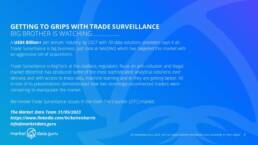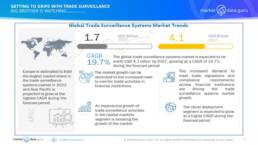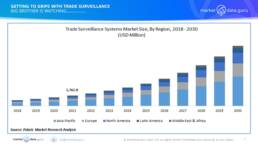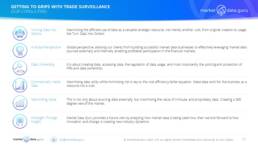

1.0 TRADE SURVEILLANCE SPECIAL REPORT – MARKET DATA COMPLIANCE
The exponential growth of the Trade Surveillance service market, estimated to be worth over US$4 Billion by 2027 is perhaps no surprise. Increased regulatory oversight across the asset class spectrum driven by pre-trade and post trade process and its analysis.
While exchange based securities markets benefit from open interest and a fully integrated risk management solutions that incorporates margin and central clearing, the same cannot be said of OTC (Over the Counter) markets. With OTC markets functioning as far less prescriptive modes of bilateral trading, these markets are often underpinned by master agreements and third-party market risk and counterparty risk management functions.
To add to the complexities of OTC markets, organic product development morphed and created deep pools of liquidity for trading one tenor period in time versus another. Spread or curve trades to speculating on the visual shape of the curve. e.g., ‘flatteners or steepeners’.

2.0 WHY OTC MARKETS ARE DIFFERENT
Trade Data or Market Data is of course the lifeblood to many underline trade surveillance solutions. For OTC market data things get more complicated than exchange-based data because the venues operating in those markets are often disparate and can be transient.
OTC venues and inter-dealer-brokers (IDB’s) are major sources of price discovery, liquidity for pre-trade pricing and execution. They play a vital role in bringing together multiple counter-parties globally which otherwise would be unable to connect directly. This diversity magnifies regulatory interest in OTC market trade surveillance.
The disparate nature of which venues or which IDB’s have major liquidity share across a range of different products or instruments is not always readily available. Which means that content acquisition can be a costly exercise to validate the liquidity provision and underline venue provenance. A prudent trade surveillance offering will of course need to cover most of its bases and therefore understand which venues of the most representative ‘fair value’ market pricing. Often resulting in the purchase of more data than required, or simply not the best data.
3.0 UNDER THE SURFACE OF OTC MARKETS
The transient nature of OTC venues is often misunderstood. To the uninitiated they might appear very much like a physical branded exchange. A large building with stone pillars and statues, representing stability and often sovereign financial longevity and prosperity.
OTC Brokers on the other hand, while branded high profile entities, are in fact underpinned by a collection of individuals that are themselves contracted liquidity relationship specialists. These individuals often work in teams covering a specialist financial product, for instance Interest Rate Swaps or Brazilian Commodities. The teams can be quite large and range from a 2–3-man team to a +20-man team. The team will often divide the trading accounts amongst themselves depending on the relationship and individual demands of the bank trader.
Its important not to underestimate these relationships in today’s hybrid markets which mix ‘voice’ with ‘technology’, because sustaining them requires an unusually high degree of trust, competence, and skill.
Successful teams providing on-desk liquidity can and do move or migrate from one IDB firm to another (It is all about money). Migratory liquidity tends to be a litigious affair. To illustrate an example of the effects of OTC liquidity migration and the effects on market data, a large vendor once unwittingly negotiated a multi-million-dollar CDS data deal with an IDB, only for the liquidity team to move to a rival broker. The vendor naturally asks itself is the data I am purchasing going to be the same now the original team has departed?

4.0 OTC MARKETS & LICENCES
Licensing of OTC data is equally challenging as many content owners put on a premium for data use classed as ‘derivates work’, a departure of the standard unit of price display. Unravelling a myriad of OTC market data content agreements is mind-numbingly time consuming and given the hourly rate for legal council is more than a market data analyst, it quickly racks up big dollars. Add to this a new heightened awareness, legal compliance departments struggle to guarantee market data licensing is adhered to, plus there are sections of the industry with deeply held suspicions of the complex licensing schedules. To often there is the erroneous assumption of better rewards for auditing and fines than in the underline data licence sale.
For multiple reasons, data licensing and compliance of OTC markets requires deep knowledge and subject matter expertise.
You only need to look at the exponential growth of the OTC markets and the correlation of those firms operating professional market data businesses. There are few constants in the world today, but one thing the reader can be sure of is the continued and more ever more intrusive regulatory environment and trade reporting. Naturally, this requires ever more market data content combined with forensic understanding and expertise of that content.
5.0 TALK TO US – WE CAN SOLVE PROBLEMS
If you require unbiased expertise that involves the licensing of OTC or Exchange based market or trade data and are unsure of the licensing, please contact us for a FREE informal chat under NDA.
The Market Data Guru Team
30 May 2023
For our information on our consulting services please visit www.marketdata.guru/data-compliance
Or Email knharris@marketdata.guru
General contact info@marketdata.guru and to obtain a pdf copy of the article


